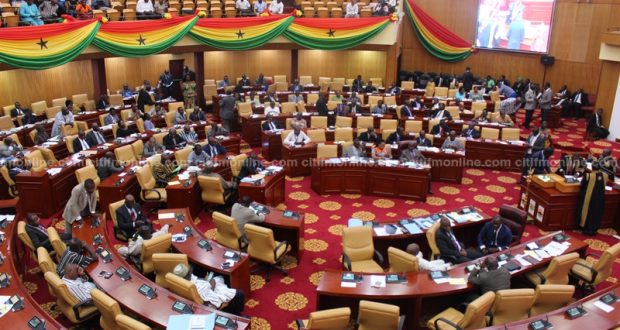
RTI Bill: Parliament rejects critical changes proposed by CSOs

Parliament has rejected important proposals made by Civil Society Organisations (CSOs) that would make the Right to Information Bill (RTI) more effective.
Portions of the proposed amendments were to ensure specific actions which are pre-requites for effective implementation are given timelines in the law.
The proposed amendments sought to tie the setting up of Information Commission, recruitment and training of information officers, establishing an effective record keeping systems for all public institutions among others are given specific times.
On Wednesday, the Speaker of Parliament Aaron Mike Oquaye ordered the removal of the Bill from the order paper to consider the proposals by civil society.
The RTI Coalition, OccupyGhana and Media Coalition on RTI presented the proposals to be incorporated into the bill before passage.
However, on Friday, the consideration of the bill was concluded.
The last amendment to the RTI Bill, which was proposed by the New Patriotic Party (NPP) Member of Parliament (MP) for Okaikoi Central, Mr Patrick Yaw Boamah, changed the implementation ministry of the bill from the Attorney General and Ministry of Justice to the Ministry of Information.
After the adoption of the amendment, the Majority Leader, Mr Osei Kyei-Mensah-Bonsu indicated that the RTI Bill would be read the third time and passed tomorrow.
Below are the demands of the CSOs.
The Coalition respectfully submits that the following clauses require further revising and refining to align the expected RTI Act, 2019, with, among others, the Constitution:
1. Transitional provision
Introduce the following transitional provision as a sub-clause to the commencement clause in the Bill.
‘The provisions of sub-section (3) of section 3, sections 42 and 50 shall come into force within ninety (90) days and the sections 57, 78, 90 and other consequential sections shall come into force within 180 days upon commencement of this Act.’
Justification: These sections are the pillars of the Act and must necessarily be in place to facilitate the process. Providing a specific timeframe for them provides the opportunity to hold duty bearers accountable for the effective implementation of the law.
2. Clause 13:
Amendments effected to the clause are still inadequate to cure its negative effect. The current draft of Clause 13 could be easily misconstrued to severely, if not completely, dilute the right to information.
Our proposal to cure the defect: Parliament to introduce a Clause 13(1) (c), to explicitly state “such information ceases to be exempt after the deliberative process is over.” Without that explicit provision, Clause 13 could easily be interpreted to make the deliberative process ongoing.
3. Clause 21 – Deferred Access
Clause 21(a) is dealing with statutorily required publications or periodic publications – the idea is that if the information is required to be made public within a short period then it does not make sense to burden the institution with applications. An application should, therefore, be reasonably deferred when it is expected to be published shortly and it will take an applicant the same time needed to go through an RTI application for the same information.
Our proposal: Since it takes about 14 to 28 days to go through an ordinary RTI application, the waiting period should be reduced to 30 days from 90 days.
21(b) needs revision – the use of the word ‘any person’ is nebulous and can be abused. It should state that if the information “has been prepared for submission to a person authorised to approve the information before it is published and is yet to be submitted”.
Also, there is a need to insert (c), which states that despite (a) and (b) information should be made available within 30 days. This is to prevent an abuse of the process
4. Clause 90
Delete ‘may’ from the text as regulation will be needed to make the law operational. It should not be discretional but mandatory.
The following provisions require re-drafting to aid clarity and flow:
5. Clause 18:
Drafting needs some work – the current rendition of Clause 18 (1) (d) dealing with making an application on behalf of another person is confusing. The sub-clause is not about capacity but whether the person representing the applicant is duly authorised to represent the person. It fits with 18(2) where it is dealing with a person representing an applicant.
Our proposal: If the application is made on behalf of another person, then the representative should provide proof of the representation.
Also, 18(5) is referring to instances where an information officer has to ‘redact’ information because part is exempt.
Our proposal: It is better to use the technical accepted term ‘redact’.
6. Clause 23: Non-existent information
There is a problem with the characterisation; – ‘information does not exist’ is very different from information that does exist but is missing. If information cannot be found it means it is missing or misplaced and can, therefore, be retrieved later. It is not the same as non-existent information. Clause 22 (10) defines non-existent information as information not generated because no obligation exists by law for it to be generated or it has been lawfully destroyed. To prevent abuse we should consider words like ‘damaged’, ‘not generated’ or lost’.
Also, Clause 22 (10) belongs to Clause 23 where it is dealing with non-existent information.
7. Clause 41
An applicant may be represented by a lawyer and/or may call an expert witness – the way it is currently drafted suggests the applicant may do one or the other.
The object of the RTI Bill is to provide for the operationalization of the constitutional right to information held by public and some private institutions, subject to exemptions that are necessary and consistent with the protection of public interest in a democratic society.
It also seeks to foster a culture of transparency and accountability in public affairs and to provide for related matters.
The RTI Bill was first drafted in 1999, reviewed in 2003, 2005 and 2007 but was only presented to Parliament in 2010.
It was brought back to the Sixth Parliament but could not be passed till the expiration of that Parliament on January 6, 2016.
After months of waiting, the Bill was laid in Parliament early in 2018.
Source: The Finder
Source: citifmonline.com






